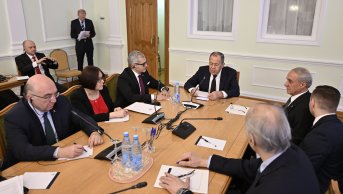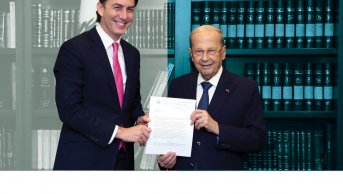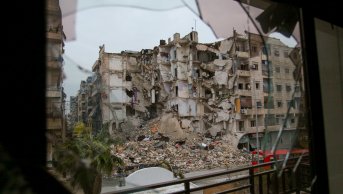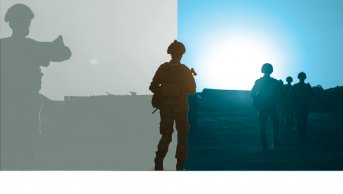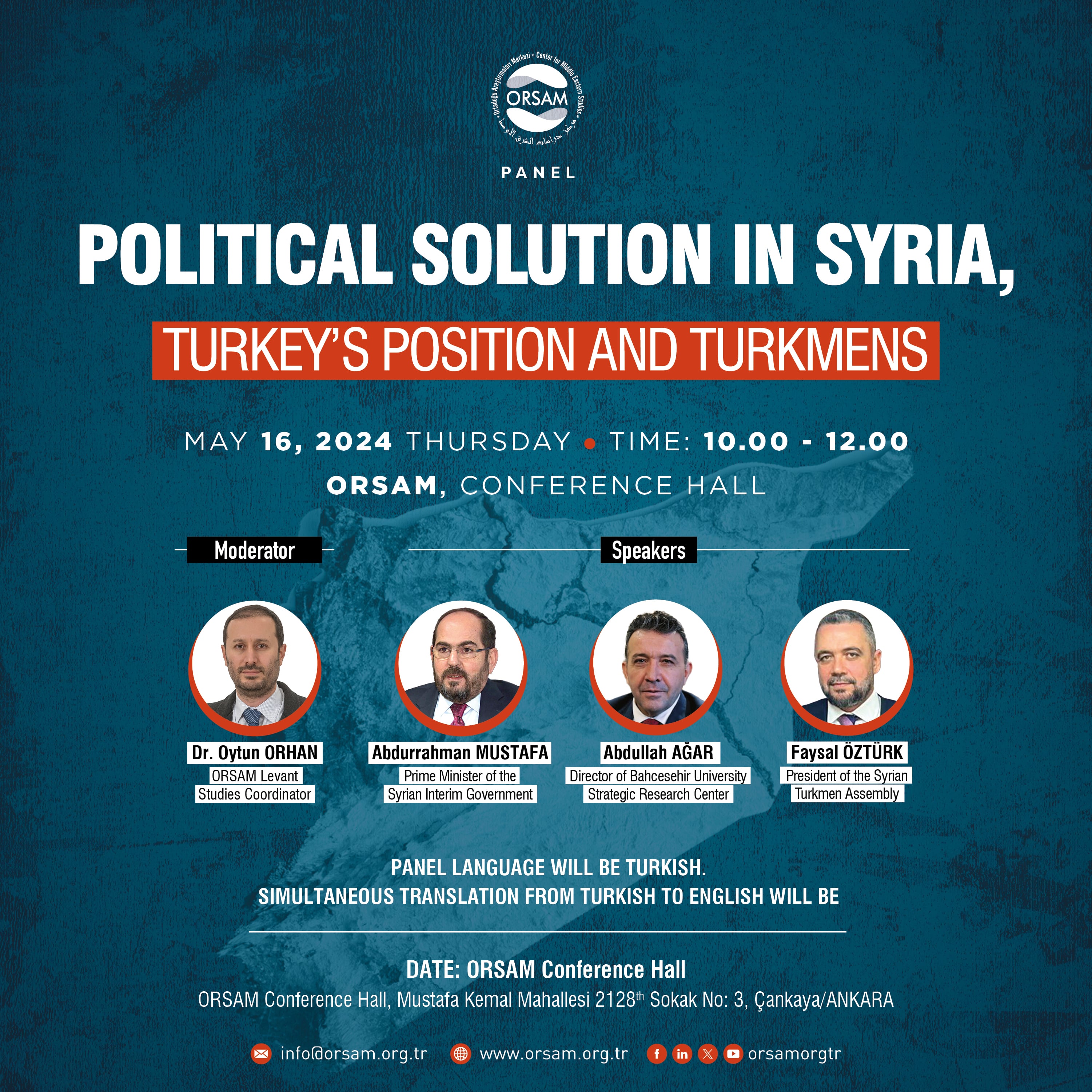The Shaky Authority of the HTS and Its Future in Idlib
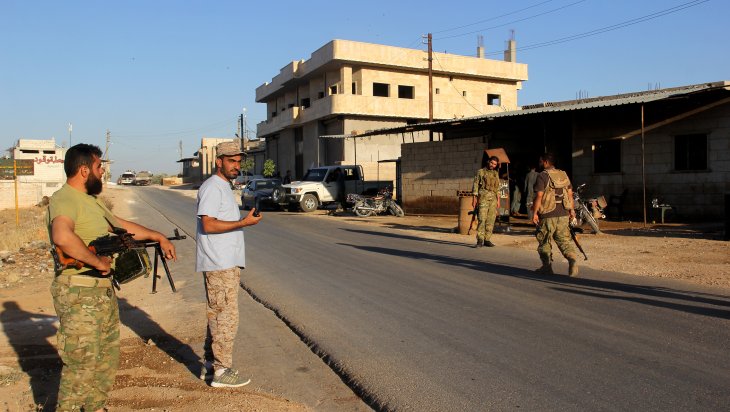
The internal dynamics of Idlib, where fighting between the Syrian regime and the armed opposition continues, have started to change in a significant way. The change in the local military, political and social dynamics was caused by factors such as the regime forces taking control of a major portion of the region after the air-backed assault that started in May 2019 and the agreements regarding Idlib between Turkey and Russia. The Hayat Tahrir al-Sham (HTS) and its political front, the Salvation government, has acquired military and administrative control of Idlib from 2017 onwards. In the initial phase of its presence in Idlib major protests were held in the large settlements of the area such as Maarat al-Nouman, Khan Shaykhoun and Atarib, with slogans such as “No place here for al-Qaeda”. The populace has gone quiet over time in the face of the superior military power of the HTS and was forced to live under its control. After three years, the anti-HTS protests started once again in April 2020 giving credence to the claims that the organization is on the decline in Idlib.
The HTS started losing ground
Even though the HTS has a large number of Syrian militants in its ranks, in terms of organizational structure, its presence in Idlib exhibits a hybrid character based ideologically on Al-Qaeda. The civilian population has not endorsed the HTS because its roots are traced back to al-Qaeda, not to the Syrian revolution. Furthermore, it is regarded as “unreliable” by other armed opposition groups since it has sought to eliminate some groups such as Nureddin Zengi, with which it formerly had relations and an alliance. Nevertheless, the weakening of the HTS cannot be explained solely by internal dynamics. After the Assad regime captured important settlements such as Khan Shaykoun, Maarat al-Nouman and Saraqib and sustained its fierce attacks against the strategic plains of Ghab and Jabal Zawiyah in the south of the M4 highway, the power of the HTS came increasingly under question. Remaining ineffective against air strikes, the HTS has failed to provide resistance against the regime offensive. Since it is the dominant power in Idlib, the toll of the failure belonged to the HTS, not to the other armed groups under the Syrian National Army. Its eroding reputation was further damaged due to the Moscow Agreement on March 5, 2020 between Turkey and Russia. According to the agreement, Turkey has openly declared its commitment to give no concessions to the extremists in the region and vowed to fight against any group that harms the sustainability of the cease-fire. After these developments, the HTS lost its central place in Idlib in terms of military and administrative influence.
The HTS’s attempts to cooperate with the regime and its consequences
The recent losses of the HTS have brought about not only administrative and military but also economic hardships. Its main sources of income are land sales, border customs and taxes levied on the people. Yet, the group endures a significant financial crisis due to factors such as Turkey’s control over the border gates, the reduction in land sales after losses to the regime and the difficulties in tax collection due to the massive movement of people after the regime’s attacks.
The limitations on its financial incomes and the gradual weakening of its authority caused the HTS to adopt a more aggressive attitude. Even though it initially had a positive attitude toward the March 5 Agreement between Turkey and Russia, afterwards it has concluded that the agreement works against its own interests. The HTS has sought to display its displeasure in the Moscow agreement through attempts to prevent the joint patrols along the M4 highway carried out by Turkish and Russian security forces. Therefore, the patrols, which have been initially planned to take place along 80 kilometers from Trunba to Ain al-Hawr, were limited to a narrow route and failed to meet the desired objective. The HTS disguised its militants and the members of the Salvation Government as civilians and incited them to start sit-ins and protests against the Turkish-Russian joint patrols. According to the group, the main cause of the protests is that Russia is not wanted in the region. Afterwards, the protesters organized by the HTS did not refrain from attacking Turkish soldiers with sticks, stones and firearms. The extremists have issued threats and sought prevention of the Turkish-Russian joint patrols from the first patrol activity on March 15, 2020 onwards and their attitude became tougher day by day. On March 19, 2020, Turkish soldiers were attacked by HTS militants using rockets. Two soldiers were martyred while one was wounded. Another armed attack against Turkish troops took place at al-Karama near Neirab on April 26, 2020. Two Turkish soldiers were wounded as a result of the brawl that ensued when the HTS militants and the Salvation Government members, who were disguised as civilians, attacked Turkish troops. Turkey has maintained its resolve against the HTS and other extremists by adopting stronger measures. These measures include further military deployment in the region and new military outposts.
As the HTS lost its influence and authority in the face of Turkey’s resolve, it has sought to implement a vital strategy and give signals that its relations with the regime may be mended. As a first step, it has attempted to establish a trade route between Sarmin and Saraqib, which is under the regime control. Yet, this attempt was thwarted by people’s reactions. As a second attempt, the HTS sought to clear the road in the west of Aleppo between Miznaz and Maarat al-Nasan and start trade relations with the regime. Having cleared the land mines in the region, the HTS attempted to initiate a commercial interaction through a corridor on April 30, 2020. This attempt provoked massive anti-HTS riots in the region. The HTS militants drove over three civilians in Maarat al-Nasan wounding three more by gunfire. The protests spread from Maarat al-Nasan to the city center of Idlib and the other settlements. Consequently, the HTS declared an end to its attempts at building a commercial passage with the regime.
The anti-HTS protests have clearly demonstrated the discontent of the civilians with the group. The civilians, who were already facing regime aggression, might have been further alienated from the group due to the violent attitude of the HTS against the protests. The fact that the HTS dared to take up arms against civilians for the purpose of engaging in trade with the Assad regime, which it has been fighting against for years, shows the ideological crisis of the group in addition to military, administrative and economic crises. Characterizing this situation as a “vital reflex” has the risk of neglecting the fact that the ground beneath the HTS has been diminishing for quite a long time. In other words, the current situation that the HTS finds itself in is a product of a process rather than a momentary reflex.
The future of the HTS in Idlib
The HTS has managed to remain in Idlib despite civil discontent, thanks to its military superiority, promises of wealth and ideological attitude. Yet in the current situation, the HTS has almost lost all these characteristics that empower itself. Failing to retrieve the support of the populace it has come to realize that it loses ground in Idlib day by day. The alternative ways to avoid failure have further hastened the downfall of the HTS. The wrong steps that have been taken have deprived the HTS of the instruments to maintain order. From this point on, its most effective weapon is its ability to create chaos. Therefore, in the period ahead, one may observe further attacks by the HTS aiming to achieve chaos. The volatile nature of the cease-fire in Idlib will not endure a chaotic environment. For this reason, some measures are needed in order to sustain the stability in the region. At this point, one of the most important measures is enabling the moderate armed opposition to take over the military and administrative control of Idlib. The moderate armed opposition is under the umbrella of the Syrian National Army and has a passive stance in Idlib. Otherwise, it is likely that the Turkish Armed Forces will face the necessity of a new military operation in the region.

